#but like my autism and adhd affect my life a lot more
Explore tagged Tumblr posts
Text
do you ever just

#I’m kind of dying a little but it’s cool#I had an appointment with a psychiatrist today and I feel like I’m kind of regretting it 😖#I went in mostly concerned about my autism and adhd and prepared to talk about/deal with those#but then she ended up prescribing me lexapro for my anxiety#so I went and did a bunch of research on that but I’m kind of terrified of taking it#because it seems like a lot of people get nasty side effects especially at first#and like having anxiety isn’t fun but I can push through that even if I’m an anxious wreck about some things#but like my autism and adhd affect my life a lot more#like being totally overstimulated in public or not being able to hold my focus at all are a lot bigger deal to me#and I’m horrible at communicating with people especially in real time rather than over email or whatever#so I didn’t really properly get across my concerns and just sort of let her prescribe what she wanted#idk now I’m having doubts and I’ve never really taken meds before beyond otc stuff or like the odd strep prescription when I was younger#especially nothing that messes with your brain like this one does#plus I just really don’t do well with not feeling well or not feeling like myself so that kind of freaks me out#and I really should be sleeping rn but I just need to get this stuff off my chest I guess#it’s like things weren’t totally fine the way they were but they were *fine* you know#not changing things is just easier I guess#I just like to be prepared and researched and this psychiatrist took me off guard#I just don’t know what to do now#if anyone’s read this far- has anyone else with audhd taken lexapro for anxiety?#did it go okay?#im kind of scared of it now#😮💨 okay I really need to go to sleep now#anxiety#autism#Adhd#actually autistic#Vent post#i guess? It was really just in the tags
2 notes
·
View notes
Note
Piggy backing anon. How dare you diagnose me via rotating cow lmfao
First you make me realize I'm ADHD, then that I'm autistic, the longer I follow this blog the more ND I get
Came for TOME stayed for the ongoing self awakenings ig
i am a mirror for all my followers to reflect on ✌️
#ask stuff#LISTEN if we're all being honest here#pretty much every person on tumblr is neurodivergent. i don't think that's a hot take#i have dealt with so much undiagnosed but relatively inconsequential brain shit that i didn't even consider that these things had Names#or that there were people out there who experienced similar things and Knew the names for it#i spent like 20 years of my life not knowing i was autistic bc no one told me that's what all the things i did n thought culminated into#and then i'd been seeing things about psychosis and schizophrenia and OCD lately and while i'm fairly certain i don't have the first two#i'm becoming more and more certain that some form of OCD lives in my brain and it's a comorbidity with ASD#so like. yeah#it's been a weird few weeks kjlnjlk#For The Record though i've all but confirmed i don't have adhd#i wasn't sure at first but the main points of adhd are not things that affect me#at least not to the debilitating degree of the people i know who do actually have it#but a lot of the overlapping stuff between adhd and autism were for sure things i related to and for a while tumblr posts combined the two#like almost all the time#so you're welcome for the adhd diagnosis as well hkjnj
2 notes
·
View notes
Note
On your blog you've talked about dealing with chronic as a result from the stress of masking your autism.
It's a bit of a different situation, but my little sister (who we've begun to suspect has adhd) has been experiencing chronic pain in her arms and legs. I may be totally off base, but I was wondering if a similar stess might potentially be a factor in her pain.
If you're willing, would you mind talking about how your pain affected before you found a way to manage it (I tried searching your tumblr, but not much came up, so sorry if I'm asking a question that's already been answered)?
Thanks either way, I love your books. Love is real!
sure buckaroo GOOD QUESTION. i have had chronic pain in some form or another for LONG TIME in a number of STRESS RELATED WAYS. in past it has been cracking teeth from clenching dang jaws while i sleep and things like that, but a few years ago it was FULL ON BODY PAIN AND TIGHTNESS like every muscle was clenching up. went to the doctor over and over all kinds of dang specialists and it was very difficult to figure out what was going on. eventually landed on a sort of nebulous trot of STRESS but i can get more specific.
there are several things about me that you would never know just from looking or even talking to me for long times. i am a bi buckaroo, i am a non-dysphoric trans buckaroo, i am an autistic buckaroo. EVERY SINGLE ONE OF THESE THINGS IS EITHER HIDDEN AUTOMATICALLY OR I AM SUCH AN EXPERT AT HIDING THAT IT IS SECOND NATURE
autism presents its trot in many ways, so my words do not apply to all, but my version is EXTREME ORGANIZATION AND ENDLESS WORK ETHIC. in way of freud (which is a silly way but sometimes good for symbolism talk) i have what you would call an OVERDEVELOPED SUPER EGO which is a double edged sword. i can write 100s of books at an incredible pace, but also feel like my body is constantly collapsing in on itself
this is not really something i consciously think about much, but eventually these health problems started creeping up. it was all from carrying this mystery tension in my body, because while it feels EASY for me to mask i believe all that tension goes somewhere and it stores up and stores up and stores up.
so i think the HEALTHY way that i have found to deal with this (i think of it as releasing the steam valve a bit so the boiler does not break down) is ART. this space where i am allowed to be CHUCK TINGLE and write without obsessing over the spelling or punctuation, or to loudly express my queerness, or explore gender, and to let my neurotypical mask down DIRECTLY RELIEVES my chronic pain because it literally makes my muscles relax.
when i started out this ARTISTIC TROT as chuck i used a LOT of metaphor to keep my privacy, with different words or different versions of people for different things, and buckaroos found this very funny. as a way to express myself artistically i also liked this metaphor trot a lot, but i have also found that the LESS metaphor i paint over my life as chuck, the better it is for my health. if you have noticed, i talk less about some of the parts of my life that were metaphors, or maybe you have seen that my voice has relaxed a bit in interviews, or that i carry myself a little differently over time, this is partially why. (there is another artistic reason that was a planned trot from the beginning and it has to do with my feelings as a young autistic buckaroo of not fitting in on this timeline, but we can dive into that later).
anyway, as PRACTICAL ADVICE i would say that FINDING A SPACE TO EXPRESS YOURSELF WITHOUT FEAR OR MASKING has been the number one trot for me. that can be a pink bag over your head writing hundreds of erotic shorts, or that can be just laying on the ground howling your heart out, or doing whatever stim you need to do.
i will also say that ONCE I REALIZED IT WAS MUSCLE TENSION getting a physical therapist helped a lot. because there are two sides, you have to start releasing steam from the steam valve, but at the same time youve also gotta start HEALING THE DAMAGE. so i think stretching and techniques like that can be very helpful.
hope that helps buckaroo LOVE IS REAL
2K notes
·
View notes
Text

Disability pride month is not over yet, so here are HC doodles for some of my faves, based on the behaviour I've seen from them so far!
Azul: Cane user! I'd like to thank the user @/mellosdrawings for introducing me to this wonderful idea! Basically, since Azul is used to more limbs, less bones, and different gravitational forces, he has some difficulty moving on land and uses his cane as a mobility aid (and a fashion item). I think his enrollment into NCR was the first time he took on a human form, which is why he still struggles (I think the Tweels shifted their forms quite early on in life, which conditioned their bodies to adapt as they grew up).
Idia: Autism! Waaa I really loved seeing him use his tablet as a way to communicate, when he isn't able to. Occasional use of disability aid is something I haven't seen represented in any media yet, it's very cool to see! His passionate outbursts about his interests remind me a lot of myself!
Kalim: ADHD! Honestly I'm afraid of stereotyping him, but a lot of his behaviours (his impulsiveness, missing of social cues, short attention span and bad memory etc.) remind me of myself and other individuals with ADHD. I like that his struggles aren't represented as humourous/quirky and are shown as genuine struggles that limit him. He makes a lot of choices, but fails to consider how these choices affect the people around him.
Some other characters I headcannon as disabled: Maellus (Autism), Silver (chronic fatigue), Leona (dyslexia)
#azul ashengrotto#twst#twisted wonderland#disney twst#disney twisted wonderland#twst azul#kalim al asim#twst kalim#twisted wonderland kalim#idia shroud#twst idia#twisted wonderland idia#disability pride month#ttcnt sketchbook
395 notes
·
View notes
Text
eye strain warning
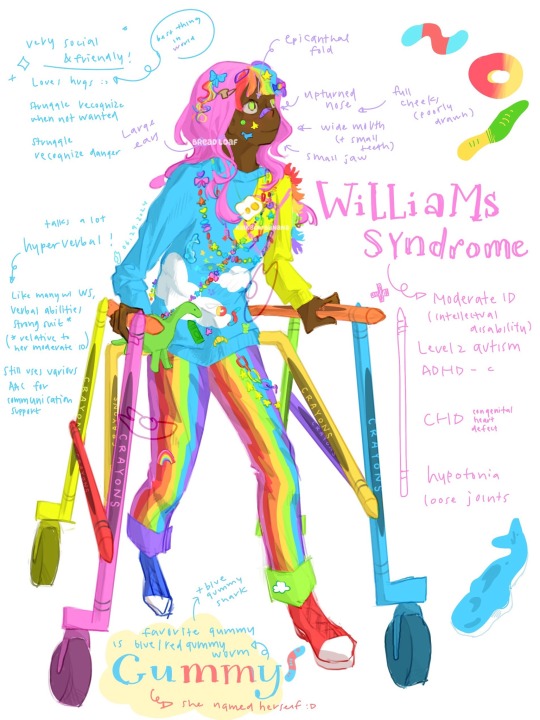
gummy 🌈🐬
[plain text: gummy 🌈rainbow emoji🐬dolphin emoji]
(^ shark emoji not blue enough)
[id: dark skinned black person with williams syndrome in decora kei fashion walk with posterior walker. person have pink hair with rainbow bangs n all sorts hair clips in hair & stickers on cheek. have many rainbow necklace include one with double yoke egg. wear blue sweater with white cloud where one sleeve is yellow horse with pink leash thing. there many pins on sweater include gummies (gummy shark, peach ring, gummy worm, gummy bear) & green crayons & others. she wear cross body green dino plushie (bag?). rainbow vertical stripe pants with rainbow n star chain. one shoe red one shoe blue. posterior walker made of different color crayons. there text around character describe her which be functionally described below. end id]
🌈🐬.
girl (complicated gender) with williams syndrome n love decora kei fashion & bright colors (she call them happy colors/excited colors)!! she has lotssss of bows n head pieces n hair clips n necklaces n bracelets n other decoration & big wardrobe with bright colored clothing! she love wear different outfits but it consistently decora kei.
she love gummy candy & named herself after them >:) blue/red gummy worm & blue gummy shark her favorites (blue gummy shark also my favorite. to look at.)
williams syndrome (also known as williams-beuren syndrome) is genetic developmental disorder micro-deletion of some of chromosome 7. for gummy, WS lead her have moderate intellectual disability (ID) & global developmental delay, level 2 autism, ADHD-c; congenital heart defects (CHD); hypotonia (low muscle tone), & loose joints.
like many people with WS, gummy very friendly & social! she love hugs & talking to people & talk lot & very physical in show affection! but also often struggle tell when other people not want be social / be social with her, be called “a lot” & “too much,” which lead her have trouble make n keep friends n make her sad—even tho WS make her extra outgoing, she also still get sad n mad n not hide it. she also struggle with danger awareness & often treat strangers like would with friend, n it been something that her support team very focused on work with her entire life because this lead her be very easily taken advantage of n be put in danger.
also like many ppl with williams syndrome, language & verbal abilities her strong suit—tho it’s relative to her moderate ID, so one shouldn’t expect she write speak communicate like average person without struggle. her words more simple, n still need many help for communication, including various form of AAC & aide person.
she has aides that pretty much 24/7 present because WS & moderate ID but working on skills so can be more independent! it something she been work very hard on entire life n she quite proud of progress.
she has many classic facial features associate with williams syndrome, like epicanthal folds at eye, upturned nose, wide mouth & small teeth, small jaw, full cheeks (badly drawn), n large ears.
70% or more people with WS have some sort cardiovascular problem, n so do gummy. she has supravalvar aortic stenosis (narrowing of aorta) which form of congenital heart defect (CHD). hers not very severe n be closely monitored.
she also have hypotonia & loose joints due to WS & uses posterior walker full time to get around. she really like her posterior walker, it shaped like many crayons :D also wear SMOs but forgot write it so oops
art fight character profile
[reblog welcome but please no repost]
#disabled#disability#decora kei#decora fashion#art#artist on tumblr#oc#original character#art fight#artfight#art fight 2024#eye strain#eye strain tw#kidcore#williams syndrome#autism#level 2 autism#intellectual disability#slug scribbles#facial difference#mobility aid#posterior walker#tw eye strain#long post
475 notes
·
View notes
Text
did you know that…
while autism functioning labels never really had set diagnosable descriptions like autism levels & autism itself in DSM, so different clinicians may have different definitions, but—
did you know that for many of them (more than you imagine, even now), what different between high functioning & low functioning is just. intellectual disability?
way they use is:
high functioning autism = autism without intellectual disability
low functioning autism = autism with intellectual disability
(so back in asperger’s vs autistic disorder diagnosis days, asperger’s & high functioning autism/HFA & low functioning autism actually all mean slightly different things)
.
yes, one thing tumblr autism community tend get wrong is: unlike autism ADHD learning disabilities, intellectual disability (as single disorder) *directly* affect *everything* about person. from conceptual/cognitive/thinking/learning/etc to social to daily living & adaptive functioning to everything you can think of. and autism community tend downplay ID & ignore autistics with ID. so someone with even mild intellectual disability can be quite different than someone with similar presentation of autism but without ID. however—
intellectual disability being only criteria for medical label, that follow you n impact you for rest of life, that claim to describe how much you overall “function” (want everyone imagine be told by everyone that you function lowly). is wrong.
am nonverbal. have high support needs & need 24/7 someone close by. diagnosed with autism that border level 2 & 3. have many severe symptoms, very impaired theory of mind & often do not even understand people exist & have own different thought n feelings that not like my own, have little to no interest in social, cannot mask n is visibly autistic, have behavioral issues, motor skill lower than bottom 1% of age group, etc etc
& another autistic with maybe mild ID, who with support & hard work is living more independently, who struggles but can speak by mouth, who have job, who with right guidance have enough social skills to keep some good in person friends
am would be called high functioning. n second person, low functioning. all because they have ID while me, don’t.
so, me get “very fortunate (sarcasm)” experience of be grouped in category n be black sheep n be expected assumed able to & be questioned why can’t do things other “high functioning” autistics can do, because they have lower support needs than me & lower autism levels than me. while second person get assumed they not able do things it too dangerous too risky & others be shocked about them do every small thing, simply because they have ID & thus must be low functioning, not because they actually cannot do it.
though. even if there someone like me but have ID. still don’t think anyone should be told they so terrible at functioning they “function lowly.”
diagnoses can be important & having comorbid disorder especially something as general as ID can mean different things compare to someone without that comorbid disorder. but language about person should be individualized based on each person, not something general that only look at diagnoses n not the person. and, that language need be actual respectful about person, because that who we are: people. even if some of us have a LOT of struggles where we physically depend on other people 24/7.
(n everytime talk about autism functioning labels, feel need to say: forcibly labeling someone with functioning labels problematic because everything just said. not because all autistics same & by same, mean verbal low support needs)
187 notes
·
View notes
Text
simply existing as neurodivergent is tiring.
no matter which it is, every neurodivergence comes with its own set of symptoms and traits that makes even sitting and trying to relax something that takes energy.
for me, my adhd makes it so that i have a CONSTANT inner monologue. and that "monologue" consists of SO much. it feels like there's a main monologue of my most prominent thoughts, another monologue in the background and another after that too, with music playing off in the distance, mental images flashing in and out and also having to stay present in the real world so i don't fuck everything up in real life. my brain is always on high speed and when it isn't there's still mental noise regardless from the monologue. and its fucking tiring. it makes my social battery lower than ever and means that i never truly get a moments' peace unless i superengineer my surroundings to force it. which again, takes energy.
if you add the fact that my autism connotes sensory issues, a baseline of anxiety for pretty much everything due to yk. uncertainty of situations, having to mask and be hypervigilant to keep up my masking etc, it becomes even more tiring. masking whilst being distracted in a conversation is even harder.
then my npd dogpiles essentially and makes it so there's a subsection of my inner monologue dedicated to screaming at me and mocking me or others all the time. that's fucking tiring.
i get intrusive thoughts. i disassociate a lot. my mood can change very quickly due to the emotional dysregulation that comes with my everything. that's tiring.
it feels like my brain is constantly doing its best to fuck with me at all times. and its doing a pretty damn good job at it.
that's not to mention other neurodivergences that other people may have such as did/osdd, schizospec disorders, cluster a, b and c personality disorders, down syndrome, dyslexia, dyspraxia, dysgraphia, dyscalculia, bipolar disorder, synaesthesia, intellectual disabilities, auditory processing disorders, anxiety disorders, depressive disorders, tourettes' syndrome, tic disorders, cerebral palsy, parkinsons', alexithymia (which i have and makes it exhausting to just. figure out how you feel at any given time and makes things such as giving consent much harder and lengthier) and so on
if you happen to have physical disabilities alongside neurodivergence, it's even fucking harder.
it's fucking hard. it's not a bed of roses, or doesn't only affect us when we're doing stuff. us sitting on the couch and trying to relax may take enormous amounts of effort that you simply do not see.
please be patient with us. we're trying our best.
#neurodivergent#adhd#actuallyautistic#actually adhd#being autistic#its the neurodivergency#asd#autism#actually autistic#bpd#npd#schizotypal#schizophrenia#schizospec#schizoaffective#szpd#schizoid#questioning szpd#cluster a#actually szpd#actually schizoid#aspd#aspd safe#actually aspd#aspd thoughts#hpd#actually antisocial#low empathy#cluster b#ocd
108 notes
·
View notes
Text
Ok, I'm gonna start a post idea I had been pondering. If you're either mentally or physically disabled and you have opinions about representation, this is the thread for you!
So, I've been seeing more people trying to tackle the topic of autism in their stories, but I've felt some of it tries to woobify a bit what is to live with autism, or just focus on the more socially acceptable quirks of it. And as someone with autism/ADHD (was suspected of it for most of my life, got it finally diagnosed by my therapist (who specializes in autism and ADHD) last year), sometimes I'd like for people to acknowledge the more unsavoury parts of it, the weird quirks, etc.
So, this post is going to be about that- If you wanna help people understand how your disability/neurodivergency affects your life, feel free to add to it! Just mention what do you have (no need for a full list, just what you consider relevant to the post) and some experiences, quirks, anecdotes or such that you think that are not often seen in stories or media, and that you consider an important part of it. They don't need to be huge things! I encourage people to share just whatever they feel comfortable. My list is gonna be a mix of stuff, but yours can be very different. Let me start!
Clothes and how they feel was surprisingly one of the most disruptive parts of my autism. As a kid, if I was forced to wear something that caused me some bad texture/sensitivity issues, it would significantly affect my behaviour and performance. It took me many years to be allowed to use mostly sportswear. (And it turns out being a "girl" (not anymore) wearing only sportswear tends to cause a whole lot of bullying)
This happens even nowadays. I've found out that non-heeled boots are more comfortable to me than sport shoes, because feeling something against the back of my foot makes me feel overwhelmed. I tend to wear yoga pants under actual pants, because they keep the actual pants' seams from causing sensory issues. There's almost a sort of ritual on how do I need to combine clothes to be able to function "normally", mostly consisting on reducing how much they annoy me.
On that topic, hygiene is actually a huge thing too. As a kid, I wasn't allowed to shower daily. Days I didn't shower, no matter how much I tried to keep my hygiene in other days, were "bad days" to me. I would literally plan hanging out with friends or eating out around the days I was allowed to shower. I could physically feel the difference between the day I showered and the day I didn't (even if I washed my face, armpits, used the bidet, etc).
This is true even nowadays. I can thankfully now shower daily, which isn't recommended by a lot of experts (specially because it can damage your hair and skin), but it's more worth to me than having days where I feel like I shouldn't be seen in public.
Being overwhelmed sucks! Meltdowns are mostly associated with kids, mostly because adults either learn to mask them, or do everything they can to AVOID having that meltdown. I've mostly figured out routines and such. There's this one place we go eat out every other Tuesday- And in the hours we go in, there's a sort of silent corner that is always free. This week's schedule was a mess, so we went yesterday to that same place, and the silent corner was filled with a very loud group. I got extremely overwhelmed. But enough masking drilled to me means I just sat there unable to talk for maybe 30 minutes.
Autistic adults still do have autism and experience often the full spread of traits, they've just found ways to mask, or avoid being in situations where they do need to do that. I've adapted my life and routine to that. But sometimes I land on situations out of my comfort zone that will make me feel just like when I was a kid. I want to freelance online because I'm fully aware I can't perform properly in a public facing job.
Group projects sucked so much. I know they suck for most people, but most times it was easier for me to do the entirety of the project by myself and add the others' names to it than dealing with chasing people for their parts. My college had a 6-months-long massive group project in the last year, with a 7 people group, which obviously I couldn't do alone. The whole experience was so harmful in so many ways I've had several full therapy sessions talking about it :'')
One of the reasons it's because mental flexibility is HARD with autism. If i set a schedule, I expect that schedule to be followed. If people agree to do a part, I expect that part to be delivered (unless there's a proper reason) on due time. People hate this a lot usually! It will tear group projects apart!
Stimming can be harmless, or it can be very annoying to some. I tend to shake legs and play with something in my hands. I could easy this off drawing in classes- My high school found out that I was paying more attention when I was allowed to draw in classes, and my academic performance was pretty much perfect, so they gave me permission to do that.
However, I had a teacher in middle school that did forbid me from drawing. I stimmed during a class with pens- She got so mad she sent me home with a note to my parents they had to sign. Fun!
Not exactly an anecdote, but I am ace. I hate the discourse about "making an autistic person be aro or ace is infantilizing autism". Aro/ace people can have autism. That's just how it is. I've been infantilized a lot for being ace- Which only got worse because I am autistic, and people perceived some of my special interests as child-ish. The combo didn't make things easy.
On that topic, people will often be very patronizing of your opinions or takes for being autistic. I've had people debate my sexuality (or lack of thereof), my gender identity and presentation, my hobbies, my preferences for everything, down to "what do you want to eat tonight?". This isn't too different to shitty takes about how "autistic people are more prone to being affected by the trans activistsTM", because people assume autistic people can't choose on their own. Trust me: We can.
Anyhow, I'd love if this post could be a good compilation of these sort of anecdotes! I think it could help people who wanna learn more about what is it to live with specific disabilities (and how to better portray them in media)
100 notes
·
View notes
Text
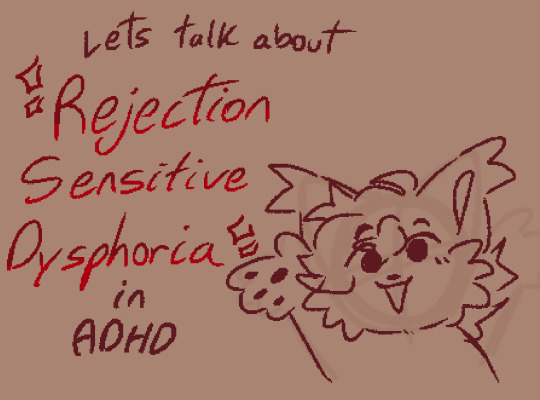
I haven't seen a lot of discussion about RSD when it comes to ADHD discussions, so I thought I would do the honors since it's been affecting me for many years and I'd like people to know more about it!
I have had a diagnosis for ADHD but was never told- instead learning I had autism through therapy but still having some behaviors that I could never explain that just Happened.
I learned I had ADHD over the summer, and with that, severe rejection sensitive dysphoria.
before reading, please keep in mind that this is mostly talking from personal experience and some skimmed research! not experiencing RSD doesn't mean you do/don't have ADHD, and it may not appear like how it appeared for me. I don't only have autism + adhd either, so those may also contribute to any differences! ^^
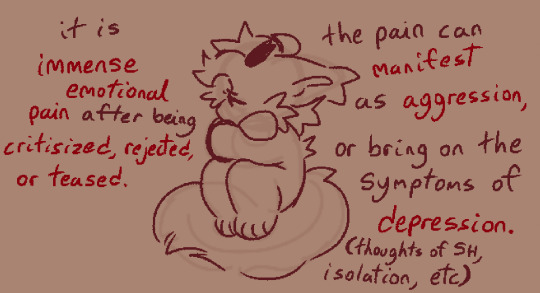
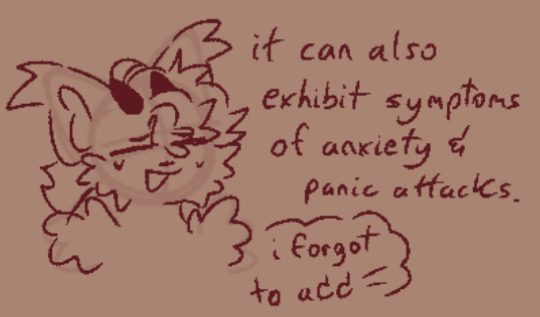
RSD is the immense emotional pain after being criticized, rejected, or even teased (ignore my misspell in the panel). This rejection can be real or perceived, and we react like this because it hurts.
The pain can manifest as aggression, bringing on symptoms of depression (thoughts of s/h, isolation, demotivation, etc) and anxiety/panic attacks.
it can cause physical aliments like the above. For me, it causes my heartrate to skyrocket, heart palpitations, the feeling of being in a crisis, and extreme shaking to occur along with stomach pain.
(In fact, right now I'm going through it because making a post talking about this, despite having & dealing with it, makes me scared of other's opinions on it.)
RSD can also take the form of avoiding situations, people, or conversations where rejection or criticism is very possible.
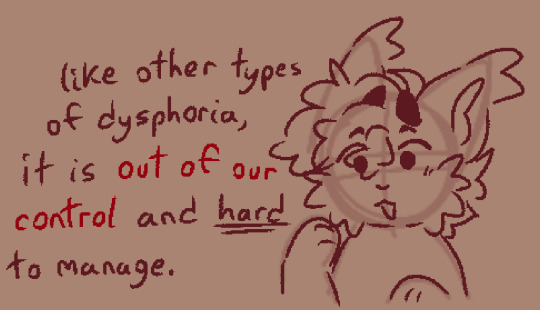
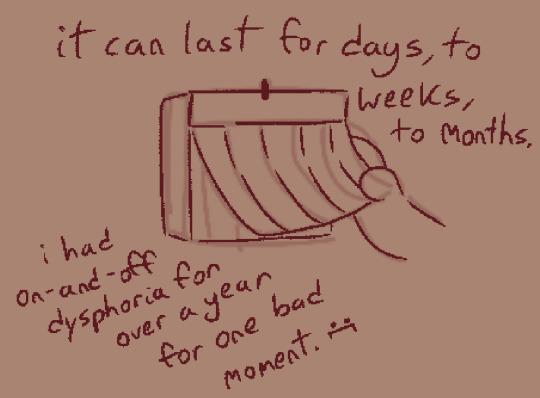
Like other types of dysphoria, it is out of our control and hard to manage. It can last from days to weeks to months, all depending on both the trigger* and the individual.
I had a RSD episode that was on-and-off for a little over a year or two; getting more tame and bearable as it slowly drifted and stopped haunting my mind with the incident.
Compared to the other times my RSD was set off, this moment was a rather big moment in my life and ended up permanently changing me moving forward - which can be the reason why it lasted so long.
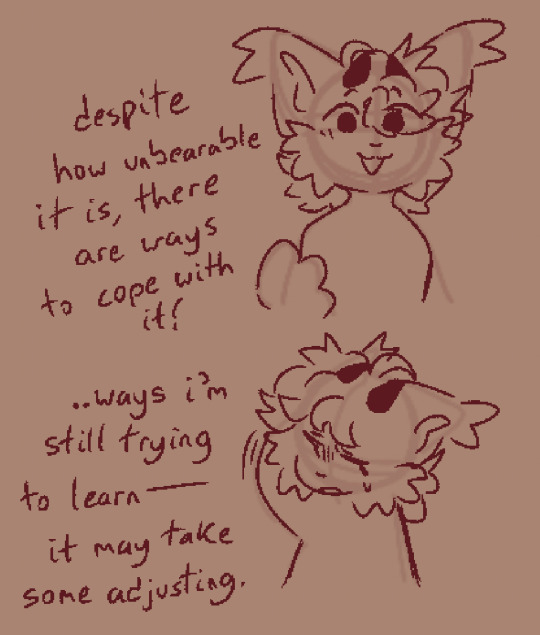
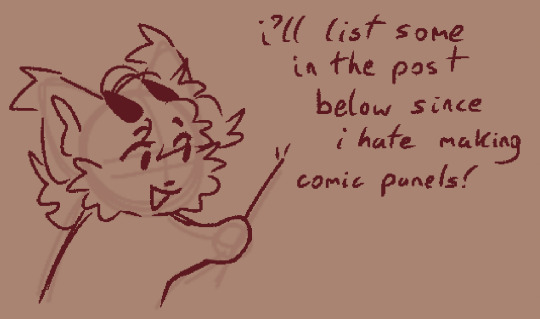
Despite how unbearable it can get, there are some ways to cope with it & lessen the effect it has.
Communicate - If you need time to process something that's told to you, you should say so (as difficult as it is). Tell the person(s) involved about your RSD, how you need time to digest information like this and take some time to relax. Trying to respond to the information while going through the head of the dysphoria will be very rough and might not be what you truly want to say.
Distract - This is really useful for me personally! Do something that grabs your attention or occupies your mind. One of RSD's main symptoms is rumination, thinking of something over and over again. I usually listen to music, draw, or play a game that won't frustrate me - like minecraft! (i'd say rain world but some of you would call me a maniac /lhj)
Perspective - This may require some communication, but it can really help and connect with others. See what the involved people thought / perceived, explain, talk. This doesn't always have the chance to end in rainbows and rekindling but at least you understand. Sometimes simply hearing the person explain their own side is enough to ease my RSD, being able to have someone explain themselves to me so i can understand them better.
I also wanna point out the "don't take it personally" thing that people try to use to deal with it isn't something i agree with since we're going to take it personally at first regardless. Later on, not really, but you're trying to cope with the symptoms... telling someone (or yourself) that they're too sensitive & over-reacting is the worse thing you could do.
With time, you can even begin to build up your 'armor' and be able to sustain yourself in situations you might get hurt in. Of course, some things may be able to sneak past and hurt you more than you expect, but at the end of the day, you're trying your best to go about it the best you can while taking so many blows. you're doing great.
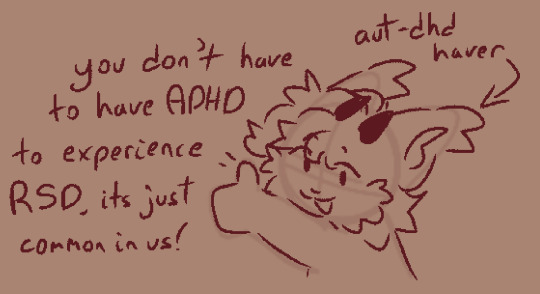

OK i dont have a lot more to add so if anyone else would like to talk about their experiences, please feel free! Character showcased here was my beloved fursona Shiki! i'm just a little neurodivergent + black artist from new york :]
hope you enjoyed it! sorry for the long post </3
#long post#rsd#adhd rsd#rejection sensitive dysphoria#neurodiversity#digital art#digital illustration#sfw furry#furry art#digital drawing#furry character#furry oc#furry artist#procreate#furry
183 notes
·
View notes
Note
Which diagnostic criteria are you referencing when you say that ADHD and autism don't have an overlap? As far as I've seen, they do: sensory issues, perception, executive function issues, and so on.
I have two answers for you. The short answer is:
That is simply not true at all. Two Google searches ("autism DSM-V criteria" and "ADHD DSM-V criteria") can easily disprove that.
The long answer is as follows:
I saw you got diagnosed with ADHD recently and congrats! idk about your assessment, but mine didn't ask me about my sensory issues. Nor do they ask about my perception on social cues, or the way I understand things. Most of the questions were geared towards executive dysfunction, how my life has been affected BC I get distracted or the things I struggle with or questions about being hyperactive and impulsive.
Because those questions get the answers needed to see if someone meets the ADHD criteria. The only time they did ask questions about social cues, imagination, sensory issues etc etc was on the pre-assessment questionnaire I had to fill in, there was a part for an autism study,,, it wont even be used or brought up my assessment, it's just that some dude is working with the clinic doing a study.
The overlap that ppl are seeing/report on is more than likely due to the fact that ADHD and autism are comorbid and there are a lot more ppl who have both rather than one or the other. Some countries and areas will only give ppl the diagnosis for one of these and not let them get tested for the other. Other countries, such as Wales, won't let autism folks get annADHD diagnosis because the NHS there sees ADHD as a stepping stone to an autism diagnosis. Some healthcare systems only believe you can have one not both.
Outside of that, there will be people who are more affected by their autism than their ADHD and vice versa and don't realise they have both. So, for eg, when they see autistic people saying "oh, I have autism and I experience these things" and they relate to it,,, they assume it's because there's this massive overlap. But if the overlap was that great, it would be much harder to diagnose ppl with one or the other. It's more than likely that they need to do some research into autism away from the idea of "it's similar to ADHD" and see if they relate to it.
There are a lot of ppl with ADHD who refuse the idea of having autism BC deep down, they have a lot ableist beliefs about autism and it's time for the ADHD community to stop doing that.
TL;DR: ADHD and autism have two very distinct lists of criteria that don't overlap. Even the testing doesn't really focus on (if at all) the criteria for the other dx. Most ppl don't know they have both or think that it's a possibility BC they are (unknowingly) ableist towards autism, haven't read into ADHD properly, their healthcare system doesn't allow for both dx, the list goes on.
#adhd#adhd problems#adhd hyperactive#adhd inattentive#neurodivergency#neurodivergent#adhd vibes#autism symptoms#autistic#adhd autism solidarity#autsim
221 notes
·
View notes
Text


I checked out this copy of Mixed Blessings from the library last week, and I opened it up to find something very special inside - it's autographed, by both William and Barbara Christopher!
I read the whole book in just over a week, which just...doesn't happen. Not for me. As I get older, my ADHD makes it harder and harder to concentrate on reading. I can listen to an audiobook in that span of time, easily. But a physical book? I don't remember the last time I read one that quickly. Having a dog has helped me manage my ADHD in other areas of my life; maybe it's filtered down to affect something like reading as well. Or maybe I felt a high level of engagement with the book because it was written by the guy who played my favorite character in my current hyperfixation show.
In any case, it was an excellent and insightful read. A lot of the language is outdated, but that's forgivable because a) it was written 35 years ago, and b) the Christophers actually update their use of terminology throughout the story as they recount their own journey in learning more about autism. Overall, Bill and Barbara seemed like two incredibly kind, gentle, compassionate people who were swimming against the tides of a system that was often none of those things. But they also had a positive impact on that very same system.
Fantastic book. 10/10
#low key thinking about calling the library and asking if i can donate a new copy of this book so i can keep the autographed one#mixed blessings#william christopher#barbara christopher#father mulcahy#mash#m*a*s*h#mashposting#(sort of)
37 notes
·
View notes
Text
I want to share my DyHard headcanons bc otherwise I will forget I think. Credit to @skunkonascarecrow for some of these bc I talk to him to come up with anything ever
- Gwen is a white wine kinda girl. Alice likes red wine
- Alice has a lot of dumb shirts like such and at least 3 with Garfield:



- she also definitely has dumb bumper stickers

- Gwen pouts a lot ! And Alice makes fun of her for it but does find it cute but she can’t just say that ofc
- Gwen has never received familial affection in her life
- Gwen is trying to distance herself from her family and is earning her own money and stuff but has to work hard to get rid of the mental stuff like standards and rules and all that
- Alice, if she has to dress formally, looks like this:


- oh Alice is a doggirl of course
- Alice listens to like any music, depending on the mood
- everyone thinks Gwen listens to classical music or something but on hard days she listens to metal. Also she enjoys the crane wives a lot I think
- Gwen has freckles but they’re mostly hidden by the makeup she wears
- I think she just wears concealer and maybe mascara + lip gloss
- Alice either just wears chapstick or does a crazy full face of makeup, though those days are usually reserved for the nights she goes to Luke’s shows before work
- Gwen undiagnosed autism. Alice undiagnosed adhd
- Alice wears boots everywhere

DO YOU SEE MY VISION??
Anyway
That’s all I can remember rn, I’ll add more later and please lmk yours!!!
38 notes
·
View notes
Text
because i needed the reminder today:
it is okay to adapt & improvise “normal” tasks to work for you. it is okay to break them into smaller steps. it is okay to take breaks. it is okay to approach in a “nonsensical” way.
if it works for you, and it isn’t hurting someone, breaking a law (caveat in tags), or going to lose you a job/get you kicked out of a school that you need (bend rules as far as they’ll bend, but don’t hurt yourself/your future in the process if you can avoid it), do that.
do what works for you.
yeah, do this for more complex tasks.
do your homework one question at a time if you can. use a premade sauce to make your favourite food if you don’t have the spoons to make it the “normal” way.
make the steps smaller and do them more frequently. take longer breaks in-between.
but i’m talking ‘simple’ tasks too.
wash every outfit the day you use it, as soon as you change. ¿is it more water? maybe. but you deserve clean clothes. if it’s difficult to remember or rely on your spoons/energy/physical limits to be able to wash things once a week or once a month, then adapt. find a way that works for you.
also, if you’re also recently discovered autistic &/or ADHD, or you’re newly physically/mentally disabled (or recent ish & still coming to terms with it), I see you.
it’s frustrating to simplify or give up on things you could’ve done before. it’s exhausting to find all the things you can’t do that you always could, especially if you never thought you would see a day you can’t do it.
you are still worthy of love and care. yes, even now. especially now.
(more personal examples & also direct comfort/reassurance below the cut)
i can’t do long staircases anymore. i used to love running up them, running or hopping down the steps. now I shakily take one step at a time, leaning heavily on a cane, and my ankles/knees still tremble and hurt. (i’m hypermobile & some of my connective tissue is deteriorating.)
i can’t read academic texts by myself anymore. there’s so many feelings about that, and it’s the most recent curve of acceptance.
i realized 3 or 4 days ago that the reason i’m falling behind on the readings for astronomy & human development (which I find fascinating) is because of the length of the readings. i keep up in sociology, but it’s smaller chapters & less reading, & I can usually skim for terms & catch enough info to participate in class. but in order to pass my classes, in order to succeed, that requires me to use a text-to-speech website or app, or to have a friend read for me.
for those who don’t know, i’m a creative writer. i write fiction and poems like it’s nothing. i also love the feel of a physical book. i’ve stayed in denial, thinking that i just need to break it into small chunks.
but i got a traumatic brain injury in November of 2019, that most affected my prefrontal cortex. i need that to focus, to self-regulate. i need it to read effectively, let alone long amounts of text.
i’ve stayed in denial about how bad that injury was, because i had enough to deal with due to everything else that nasty concussion did (shaking trauma memories loose, breaking masks & layers of amnesia within trauma disorders, breaking autism mask, severe emotional dysregulation i’m still recovering from).
but i can’t keep up with university classes if i keep trying to force myself to read the same way i did before. i need to use screen readers or text-to-speech, i need to rely on friends or family. i need to accept help.
and it sucks. it’s a terrifying loss of independence. it’s frustrating. there’s a lot of grief.
but this is my life now. i have to adapt.
all this to say, be gentle and kind with yourself. treat yourself the way you want to be treated. learn to tolerate yourself. (i would say ‘accept & love yourself’ but that’s its own learning curve.) adapt your space & your actions to match your current capabilities. prioritize completing self-care tasks, even if you don’t/can’t do it perfectly.
you deserve to, and can, accommodate yourself. the world around you may not be accessible, but as much as you’re able (to your degree of independence & financial limits/budgets), find ways to accommodate yourself.
and treat yourself once in a while. it doesn’t have to be expensive or difficult. sitting in your car (if you have one) in the lot of a nature park is better than never seeing trees. a poor-quality drawing is better than never drawing again. a cheap thrifted or dollar store plushy is better than no plushy. whatever it is you want to do or have, within your limits, do it your way. treat yourself to your favourite things if you can.
we weren’t put into this world to suffer. we weren’t put in this world to lose all our dreams.
we arrived to live. we arrived to have fun. we arrived to create. we arrived to play. we arrived to love (platonic, romantic, etc.). we arrived to dance and sing (even “badly”).
and maybe your disabilities steal some of these from you. but if you can find even one thing that makes it worth it, if you can make one thing accessible again....do it. make it happen. you deserve happiness and relief and love, especially now.
and if you don’t believe it right now, that’s okay. i’ll hold hope for you until you can. 💜
~Nico
#caveat#break the law if it isn’t harmful & you won’t get caught#just don’t put yourself at risk of misdemeanor/criminality if you can avoid it#this got away from me#but like. it’s true#and heartfelt#i love you all#even strangers. we’re alive together & that’s beautiful.#~Nico#disabled#trauma#disabilities#traumatic brain injury#long post
14 notes
·
View notes
Text
On Being "Socially Nonhuman"
One thing I've been mulling over lately...
I love how acceptance of physical nonhumanity is increasing now. I think it's very positive, and especially for those who experience clinical zoanthropy - so much support to you creatures!
Personally, I don't feel physically nonhuman at all. Not even in a figurative sense. My physical humanity has been a big part of my life's narrative, for better or worse - I've had plenty of trouble with species dysphoria in the past, but my path to healing has always been to recognise the joys in being human-bodied even if it doesn't reflect what I really am.
But the consideration - "oh, well, am I physically nonhuman?" - led me to a different idea that is just... sticking with me now, and I wanted to share it in case any other nonhuman folks relate. And also just for the sake of sharing, I need to do that more!
I'm physically human, but my nonhumanity feels... externally impactful on a level where I feel like referring to it as an "identity" alone is maybe a bit minimising.
This is because, far as I can tell, I just don't... act or feel in the way humans do?
The best examples of this are all absences.
I'm asexual, in the specific sense where I don't feel sexual attraction or desire at all, and never have. I genuinely cannot comprehend those experiences. This is pretty impactful and isolating all on its own.
But even more jarring is that I don't feel love in any conventional way. And I don't mean "just" romantic love - I mean any love at all. I don't love my friends, I don't love my family, I don't love my pets. This probably sounds horrible, but it's not! I can feel affection.
What separates my affection from "love" is that it's non-selective - I don't bond with specific individuals. A more palatable way to put this might be to say that I love my cat, but I love the neighbour's cat I see out the window just as much. But that feels reductive, because selectivity is a key part of what defines "love"! Can it be "love" if you feel it for everyone, whether you know them personally or not? Not really! It's a different thing.
And the other thing I'd say I'm distinctly lacking is, uh... survival instinct? Whatever drive pushes people (and animals) to keep going even when times are hard, even when things are desperate, on the hope that they'll make it to the other side. I don't experience that and I don't understand it (though, genuinely, I do wish I did).
Other ways I'm behaviourally inhuman are a bit subtler and harder to define. The way I think kinda throws people for a loop a lot - there are things that seem naturally intuitive to me, that other people genuinely struggle with. It's not a brag cause there's other things that are absolutely the reverse, ahah!
I guess, I thought it could be explained by neurodivergence for a while, but it all seems to run so much deeper than autism and ADHD could account for.
I have to mask myself to appear human. I have to mask any time I'm around other people, no matter how much I trust them, because I know trust only goes so far and there's some things I experience and feel that - to most people - are so "out there" that they'd just sound unhealthy.
There are things that are a normal part of my life that would be radically weird for most folks. This means I have to hide parts of my candid experience of life just to avoid uncomfortable attention or concern.
I don't like attention! I'm eccentric even when masking. The best I can do is "acceptably weird".
Fact of the matter is, you just can't live a safe, reasonable life while being open about the fact that your normal experience of the world is as a quasi-deity who became trapped in a human body by accident, who remembers the beginnings of life on Earth, who can sense the spirits of plants and animals, who peers through the layers of reality, and sometimes reacts to things before they happen. These things are all normal for me - there's no way I can be genuinely honest about myself while also "being human".
What it adds up to is that I feel viscerally nonhuman in a way that has a profound impact on my external life - yet still, I'm physically human. I am keenly aware of how my human brain impacts my way of thinking, how my human hormones affect how I feel.
So I'm not physically nonhuman, but I'm... socially nonhuman?
If you take "social" to encompass things like emotions and viewpoints and such, as well as how you talk and act?
My nonhumanity is socially impactful, and that impacts the physical (insofar as it impacts how I act, how I feel, and how I engage with the world).
It's an identity, yes, but it's not... self-contained. I can't really pass as "a normal person who happens to be nonhuman".
I doubt I'm the only one who experiences something like this! And that's part of why I'm even putting this out there. I don't exactly expect (or need) "socially nonhuman" to catch on as a term, but I wanted to say that this is how I feel, and that others who feel this way are not alone.
It can seem like a very lonely existence, I suppose. I don't know if I'll ever feel comfortable to express my genuine self around other people. Even online, I mask and hide. I would be seen differently if I didn't do that. Connection and belonging are fulfilling to me, and I value them too much to lose them just for the sake of being honest about stuff that most people wouldn't understand anyway!
Still, I don't really regret being nonhuman in this way. This is just who I am! I wouldn't be me if I were different.
#genuinely would love to hear if anyone has any thoughts on this#or relates at all!#nonhumanity#nonhuman#otherkin#deitykin#spiritkin#alterhuman
10 notes
·
View notes
Text
Okay, so. Introductions. Introductions. The start of a story. The way you get to know someone and sympathize with them. The opening act.
Well. Here's mine.
Hello. Salutations. I hope you're well. My name is Eucalyptus. People I know call me Euca. Or Euclid. Interchangable.
I'm 19.
My gender is... A tad complicated. But I've spent a lot of time working it out. I identify as a bit of a girl, but not really in a way that could be binary. But definitely girl. And by that matter, I'm trans. I'm proud to be. I'm still working out getting hrt. I'm somewhat socially transitioned.
I like to go by She/Her and It/It's primarily. Fae/Faer and Bear/Bears/Bearself is also acceptable. They/Them is fine.
I still grow a beard. I wear dresses. i wear a trench coat. I like to think I'm a bit of a femme butch. Take that how you will.
a few facts about me:
- I was born in February. My assigned pregnancy cravings food was and is chocolate waffles with cheese on them [I like them with strawberry jelly and chicken nuggets added]
- I am kind of a Sasquatch. Thank my mutually hairy parents and the people before them. I come from a long line of musicians I have Hungarian, Croatian, Czechlovakian, Irish, Scottish, and Romani blood coursing through my veins.
- but for simple ease I am American. WA. Sleep is a concept I tango with often. You get me.
- I like to draw. A lot. I also like to write but it comes and goes. I also make food. I can cook and bake. Im good at grilled cheese. I wish to make food creations that would make the powers that me tremble in fear. Also I listen to and sometimes fiddle around with music. I go to karaoke occasionally.
- I like my chocolate cake with strawberry filling, and a side of tapatío sauce and canned nacho cheese sauce. i compare it to a spicy cheesecake.
- I'm neurodivergent. Autism and ADHD. Dual gifted genetics yet again. I think of it like having high ram processing and laggy response time. My brain Always has multiple tabs and programs open.
- I'm polyamorous. I have a lot of unrequited life and affection and so far I'm dating two people [@tinysweetvoid @neosiaxiom] and I love both of them dearly. I don't know how I did it but I did. The power of autistic nat 20 seduction and deduction rolls, I guess?? Oh and I guess I'm somewhere along the lines of Demi. I crush pretty easily.
- I own a couple projects. i mostly work on my project @project-root. I also am apart of the team behind @echrosia. I'll add more of my works as they come up.
- my favorite colors are bruise tone magenta and neon pink. What's yours?
- I like to talk a lot. Not many can outpace me. So far only one person has. But I shall hold the title of strongest yapper ever.
- my favorite movies are Who Framed Rodger Rabbit, Paulie, Up, Monsters Inc, and probably the FNAF movie if I must pick something modern. My favorite shows are Inside Job, Carol & The End Of The World, Batman The Animated Series, Sense8, and I Am Not Okay With This. I don't think I have a favorite song or book. It changes often.
That aside. I hope we can perhaps be friends if what I post interests you. Feel free to submit an ask or send a DM. I'm good at problem solving and I like to think I'm funny. Have a nice day 👉👉
- E. Endless.
#intro post#introduction#yes hi#ill add tags here as I see fit#im not super organized#Euclid Tag#<-- example#for now
16 notes
·
View notes
Text
hey kids, binya here !
to all our jellyfrogs, i love you (/p) and i am very proud of you always <3
you're all wonderful and we really appreciate the asks and messages y'all send us. that said — and i'm sorry that i have to say this — some of you have told us some quite concerning things. and as much as we wish we could help, sometimes we are not the best people to tell about such things. so please could i set some boundaries ?
please do not send asks about things like self harm, eating disorders, and suicide. i know how hard it is because i've struggled with these things too. but please talk to a doctor or someone who is actually in your life and able to actively help, because i can't contact your parents or report anything to your local hospital; i really can't do anything about these serious problems from here.
me and @etherealspacejelly care for you all very much and we want to help but we have to look after our own mental health too and sometimes things can be triggering for us. i personally have been diagnosed with anxiety, depression, and anorexia nervosa, as well as autism and adhd, and i'm on the waiting list for gender services. i am strong and i've made so much progress with all of these over the past decade, especially the eating disorder. a lot of these diagnoses are from many years ago. but they all still do affect me and i have to be careful about that.
please remember that i am 22 and robin is 20. we are just two young queer people on the internet going through our own things and still in education. we are doing our best.
if you are having any of these issues and feel as if you can't tell someone in real life, please call or text a helpline to speak to people who actually have training in these areas.
meanwhile, we love supporting you through other things like self expression, lgbtqia+ stuff, autism and adhd, listening to you infodump, etc. and asks saying things like "i ate all my dinner today !" or "i'm a week clean !" are okay !! we are really proud of you for these things and we know it's not always possible to get validation for your effort from people in your life.
you're all very brave for making it through each day of the hell that is your teenage years. but i promise it won't always be this hard ! in ten years you will be just like us or even better !
you are loved and we are always here for you; just please also talk to a professional when possible, because they can help you a lot more than we can. again, we are not really dads, and we are certainly not therapists. we are two boy-type-creatures who are only just out of childhood ourselves.
thank you <3
38 notes
·
View notes